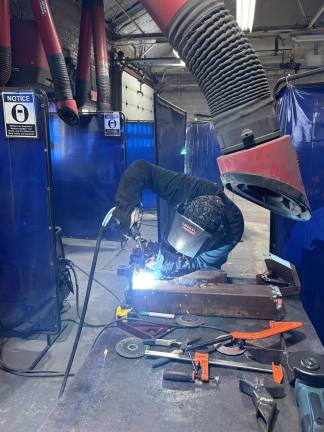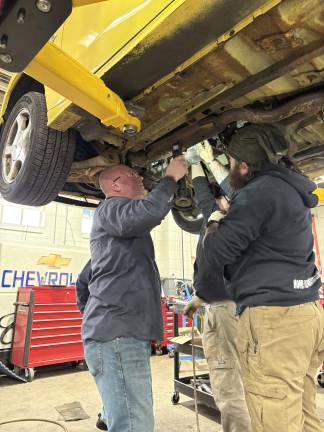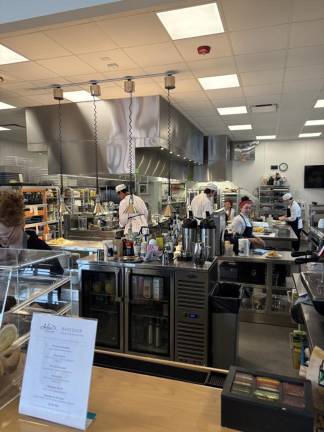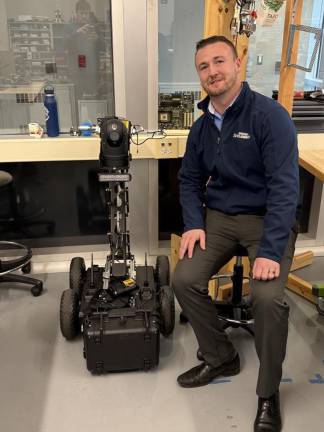From classroom to career
EDUCATION. SCCC serves a wide range of students with the goal of placing them in jobs as soon as possible.




Sussex County Community College (SCCC) annually educates about 3,300 people, ranging from current high school students to those in middle age and older, with the goal of placing them in jobs as soon as possible.
“Lately, there have been notable changes, but I think if you ask anyone - from the student body to the faculty and administration - this is a great time to be on campus,” said Cory Homer, the interim president who took the reins in January.
Demand for skilled workers
U.S. Department of Labor data show a need for tradespeople, said Jason Fruge, SCCC dean of technical occupations.
Current trends favor academic certificate programs, where students get training and go out into the workforce faster.
Then if they want to pursue an associate degree, they can take more general education classes online or at night.
From the moment that students enter a program, the staff is sharing job leads and answering questions about specific industries, Fruge said.
“There is constant push and support to get our students out there to work via an internship or good paying job.“
As things have become more expensive, adults are returning to upscale their skillsets or find a new career,” Fruge added. “There has been an uptick in older students taking advantage of training and any internal partnerships they might have with a current employer. Regardless of age, our students want skills that will be in demand 20 years down the road.”
The college offers a variety of short-term certificate programs - 15 and 30 credits - that students may complete within a year so they can switch careers quickly. Those programs are offered in automotive, diesel, machine tool, optics and other areas.
“Technical occupations is a combination of our trades-based programs, which you would consider to be more like your dirty trades, such as welding, automotive or diesel, and construction electrical line worker,” Fruge said. “However, I also oversee exercise science, culinary and baking hospitality and Arbor restaurant, medical assistant, magnet horticulture, optics and advanced manufacturing.”
The curriculum varies, from early college programs for high school seniors to classes for more traditional college students and, recently, for many older students, Fruge added.
More advanced technology
“We also know that the technology in these trades is becoming more advanced, and that’s a great avenue for new workers coming into the industry to showcase their skill,” Fruge said. “A lot of interface systems are computer-based.
“If you Google search everything from HVAC to plumbing to welding to automotive, I’m pretty sure you’ll see a huge need for technicians and mechanics that just can’t be replaced. Come here to learn a trade or skill without falling into debt and then get out there and make some money.”
SCCC’s welding program helps supply workers to rebuild bridges, and the machine tool technology program teaches students how to make precision parts, which are used in a variety of industries, such as automotive, aerospace, medical, defense and electronics.
Automotive service technology and diesel service technology courses help meet the demand for mechanics.
Brianna Miller, SCCC’s supervisor of welding, has seen the program grow in recent years.
“We’ve come a long way since I started,” said Miller, who ran a welding business with a partner in Blairstown for seven years before arriving at SCCC. “We offer three different types of degrees to fit everybody’s needs.”
Her students run the gamut from part-time high school students to professionals looking to switch fields or increase their skills. One of her recent students was in his 70s.
“This program is perfect for a kid coming out of high school, someone a bit older who is looking to improve their skills and everything in between,” Miller said. “Part of our growth has certainly been from adults coming back to school.”
Relationships with local and regional businesses help place students in internships and potential job opportunities.
“For example, RS Phillips, a Sussex County steel supplier and fabrication company, has four or five of our guys right now on full-time staff,” she said. “Welding is in everything, from airplanes to the medical field to pipe fittings and soldering. Welding will never go away.”
Culinary and hospitality
Martin Kester, SCCC’s senior culinary arts supervisor, said the program doubled in size the first year after it moved to its new location.
“Arbor, our restaurant, was launched in the fall of 2023, and this past year, we are up over three dozen students among our three programs: culinary arts, baking pastry arts and hotel and restaurant management.
“The restaurant is a public-facing program for the college through which we probably interact with the community more than any other program, and the community plays an important role in providing feedback,” he said.
“I think we’re on pace to have over 2,700 guests come to the restaurant and about another 1,200 guests for the bake shop and 675 people through the non-credit Friday night cooking workshops that are open to anyone.“
Between going to the CIA (Culinary Institute of America) and the restaurants I worked at, direct mentorship was stressed, and if my staff grew and went on to do bigger and better things, it was celebrated,” he said. “Many people who worked under me have gone on to be executive chefs at restaurants, and our students can take advantage of these types of networks.”
SCCC offers a one-year 30-credit certificate for culinary and baking programs to get students started in the industry and a two-year 60-credit associate degree to prepare them to get a job in the industry or to transfer to a four-year institution.
Adult Transition Center
For students ages 18-24 with intellectual or developmental disabilities, SCCC’s Adult Transition Center provides a two-year post-secondary program that includes career exploration with on-site job coaching.
“Some of our students have been employed or are employed and want to improve their skills to advance within their career while others are looking for an entry-level position,” said Victoria Hoskin, the college’s manager of career and transitional programs. “We assist them in resume writing, interview skills and job exploration - life skills, really.”
Another important service is assisting parents once their child leaves the educational system, she said.
Pike County satellite campus
To better serve the tri-county area, SCCC began expanding into Pike County, Pa.
The college runs high school programming out of Delaware Valley High School with classes similar to “what we have here in terms of liberal arts, business, history and math,” said Homer, who also is the mayor of Matamoras, Pa.
“We filed for approval to begin offering evening programs for college-age students in Pennsylvania because when there isn’t a local college available, students tend to do nothing for a period of time,” Homer added. “This brings another offering to the area and by bringing in more students from outside Sussex, we can supplement fees and keep costs low for everyone.“
We are taking a look at the labor market in the area so we can best serve the population, similar to what we do in Sussex.”
